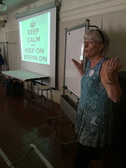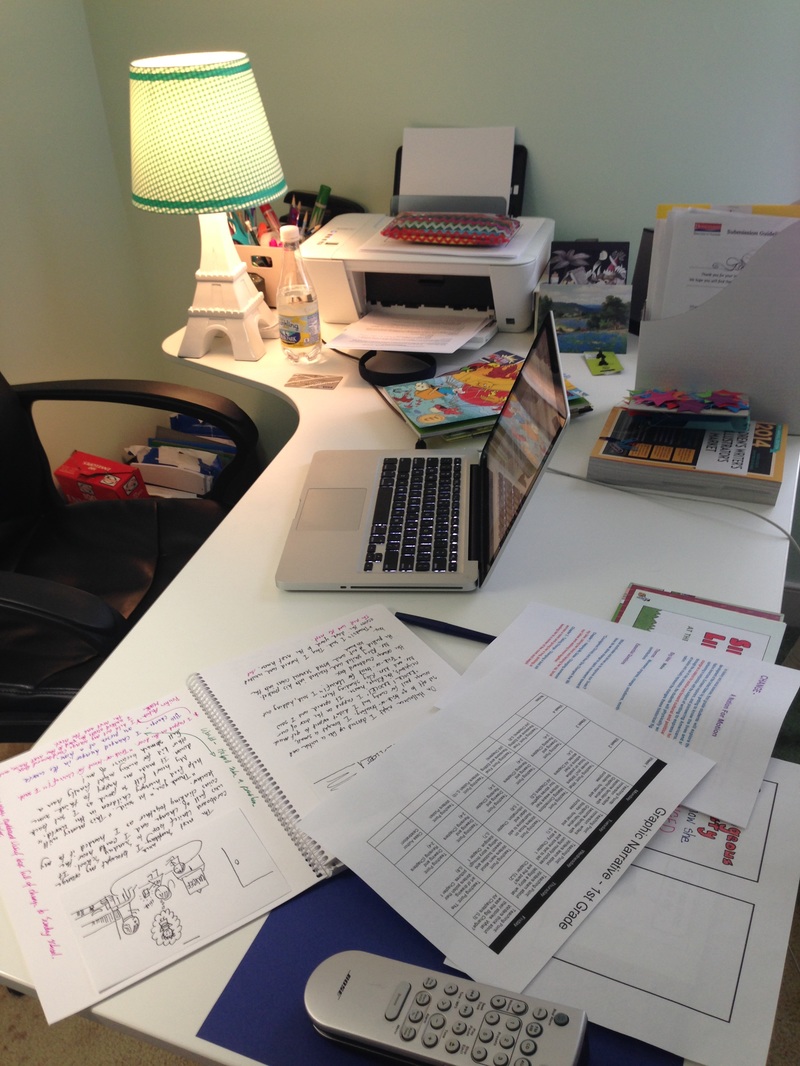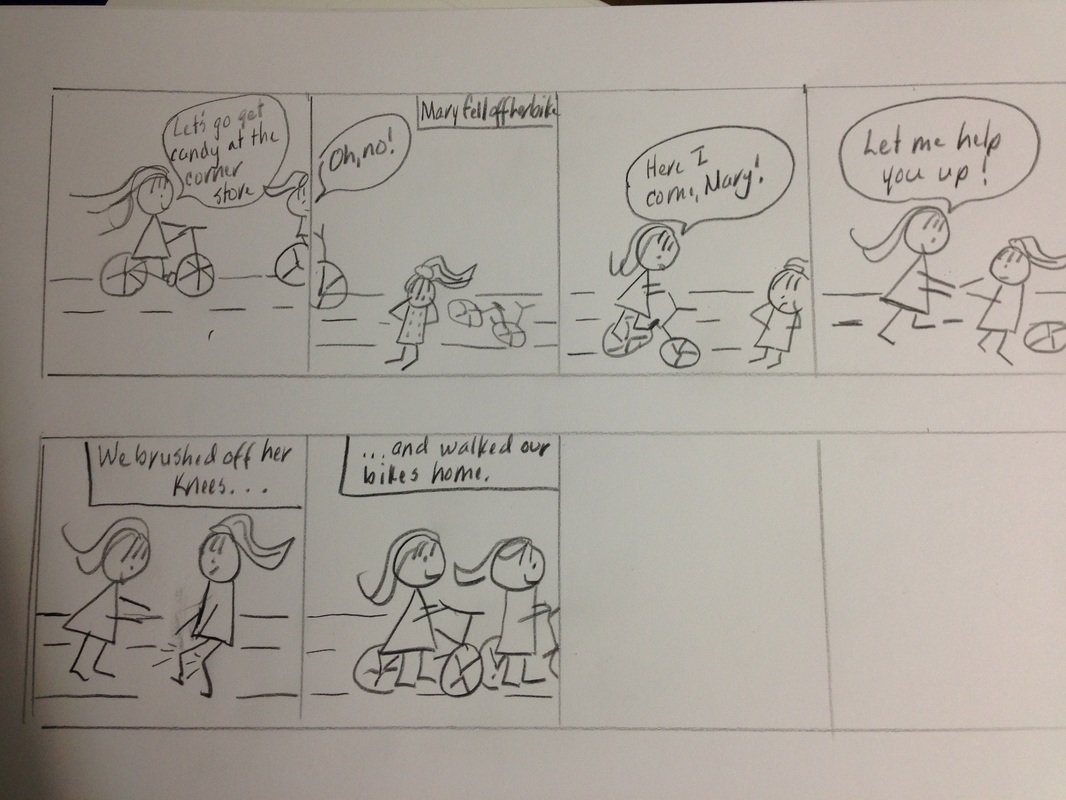
Sometimes it pays to just take a step back and use a wide lens to reflect on what you are doing or where you are going in life. We get so caught up in the moment, so involved in figuring out the steps we take to move through our days, that we forget to plan those steps in the context of the whole journey.
You can get lost that way.
I have been using these snow days to work on my first grade Graphic Narrative Unit of Study and, well, you might be able to discern my mindset as I sit amidst the planning. It has gradually occurred to me that I may be making something that goes far beyond what 6 and 7 year olds can (or should?) be doing with writing.
You can get lost that way.
I have been using these snow days to work on my first grade Graphic Narrative Unit of Study and, well, you might be able to discern my mindset as I sit amidst the planning. It has gradually occurred to me that I may be making something that goes far beyond what 6 and 7 year olds can (or should?) be doing with writing.
But, you know me....then I hear my writing teacher's inner voice remind me that our youngest writers are capable of so much, and that it is our job to place opportunities to create with words and pictures in front of them. The writers themselves will determine how far they can go with those opportunities.
It's the word "should" in the above sentence that has me sitting back and using a wider lens as I plan this unit. My original plan called for students to sketch and write 4 stories about times in their lives where they changed something using positive actions. Those stories have been written over a 4 month period - one lesson per month. Three are done. We will be writing the last one next week. Later next month, the big unit of study, the plan on which I am working right now, is to take all 4 of those stories and combine them into one graphic narrative chapter book.
...graphic narrative chapter book...
...first grade...
The thing is, I am doing the work I will expect of the first graders as I write the lessons. I have my four stories sketched out in my sketchbook. I have created a scope and sequence for the unit of study, 8 lessons over a 3 -4 week period. After two days of immersion to familiarize them in the genre as both readers and writers, the students will begin working on Chapter One.
I got started.
It was not so easy. Of course, I am a perfectionist in terms of decision-making. I had to really think hard and plan out my ideas as I translated my written story into primarily pictures with speech bubbles. Below is my chapter one draft.
It's the word "should" in the above sentence that has me sitting back and using a wider lens as I plan this unit. My original plan called for students to sketch and write 4 stories about times in their lives where they changed something using positive actions. Those stories have been written over a 4 month period - one lesson per month. Three are done. We will be writing the last one next week. Later next month, the big unit of study, the plan on which I am working right now, is to take all 4 of those stories and combine them into one graphic narrative chapter book.
...graphic narrative chapter book...
...first grade...
The thing is, I am doing the work I will expect of the first graders as I write the lessons. I have my four stories sketched out in my sketchbook. I have created a scope and sequence for the unit of study, 8 lessons over a 3 -4 week period. After two days of immersion to familiarize them in the genre as both readers and writers, the students will begin working on Chapter One.
I got started.
It was not so easy. Of course, I am a perfectionist in terms of decision-making. I had to really think hard and plan out my ideas as I translated my written story into primarily pictures with speech bubbles. Below is my chapter one draft.
But it was also lots of fun! And creative! And it was drawing! And it will soon be coloring!!
Drawing characters and showing movement in pencil is clearly not my forte. But my hope is that when students see that my sketches are simple, they will see that "just do your best" is an access point to making this work. We can all do this!
I guess my real dilemma right now is seeing beyond the trees to the forest. I firmly believe that our first grade writers can, will, and should create a graphic narrative from stories they have already collected. But should it be all 4 chapters? How much is too much? Should I let them choose their favorite story of the four and create one beautiful graphic narrative picture book?
I want this unit of study to be a creative and exciting expression of our writers' experiences. I want it to be fun. I want first grade writers to holler with enthusiasm when I walk in the room because they just can't wait to get started.
How much is too much?
I think my writing teacher's heart is beginning to see the answer. I will continue to write the lessons of this unit (which, by the way, could easily be modified to be used in any elementary classroom) and talk to my colleagues.
I know that #allkidscanwrite.
But, just as important, I want to be sure that #allkidslovetowrite.
Have a great writing week!
Drawing characters and showing movement in pencil is clearly not my forte. But my hope is that when students see that my sketches are simple, they will see that "just do your best" is an access point to making this work. We can all do this!
I guess my real dilemma right now is seeing beyond the trees to the forest. I firmly believe that our first grade writers can, will, and should create a graphic narrative from stories they have already collected. But should it be all 4 chapters? How much is too much? Should I let them choose their favorite story of the four and create one beautiful graphic narrative picture book?
I want this unit of study to be a creative and exciting expression of our writers' experiences. I want it to be fun. I want first grade writers to holler with enthusiasm when I walk in the room because they just can't wait to get started.
How much is too much?
I think my writing teacher's heart is beginning to see the answer. I will continue to write the lessons of this unit (which, by the way, could easily be modified to be used in any elementary classroom) and talk to my colleagues.
I know that #allkidscanwrite.
But, just as important, I want to be sure that #allkidslovetowrite.
Have a great writing week!


 RSS Feed
RSS Feed
